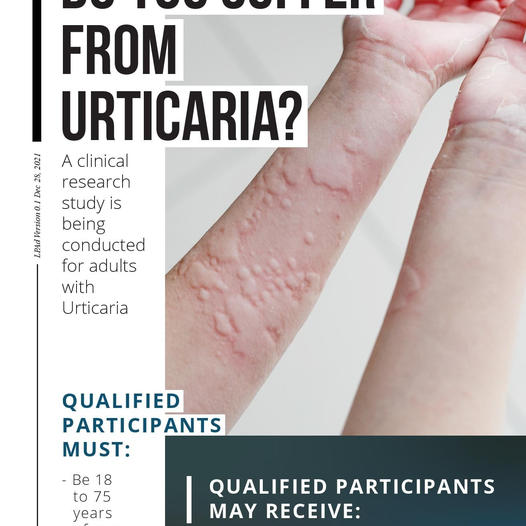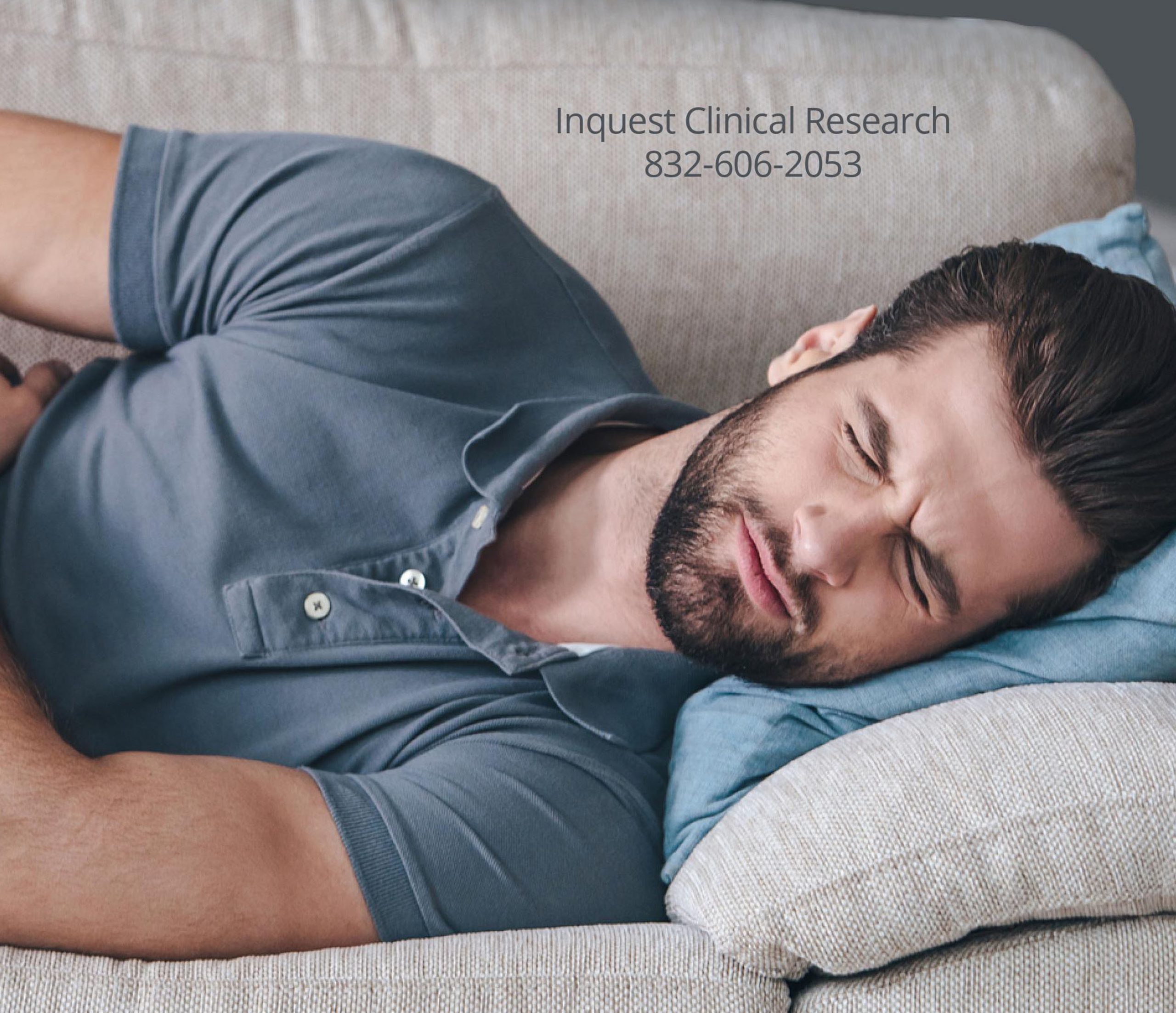Clinical Trial
Urticaria Clinical Research Trials in Houston and Bay Town.
Ongoing Clinical Research – Learn more>

Connecting with patients and practicing physicians. No insurance is required, and you may be reimbursed for your time and travel expenses.
Inquest
more>
If you are interested in participating in a clinical research study or would like more information about our specific trials. Those who qualify may receive Reimbursement for study-related travel, study-related care from local doctors, and study medication at no cost.
If you or anyone you know is interested in learning more about our research opportunities, please contact us by phone at (832) 641-8718– Houston, Baytown, TX
Inquest
Greater Houston & Bay Town
Clinical Research is currently seeking qualified patients for a number of study opportunities.
How can you get onto a trial?
We Appreciate your interest.
Urticaria
Urticaria, often known as hives, is a rapid occurrence of light red lumps or welts on the skin. Angioedema is the term for the swelling that commonly occurs with hives. Chronic hives are defined as welts that last longer than six weeks and repeat often throughout months or years. The reason of persistent hives is frequently unknown. Hives that last for a long time can be highly unpleasant, interfering with sleeping and daily activities. Antihistamines and anti-itch medicines give relief for many people.
Around 20% of people get hives at some point in life. The problem might be long-term or short-term. Severe hives endure for 6 weeks or less and are caused by interaction to an allergen or irritants, such as food or contact with a plant.
Hives’ welts often can combine together to produce plaques, which are bigger regions of hives. Hives usually go away within 24 hours, while they may last for several days or more.
Hives come in a number of forms
Chronic Urticaria
Chronic hives are long-term outbreaks that aren’t always linked to a specific cause. This disorder, also known as chronic urticaria, is characterized by recurring rashes that might disrupt our daily routine. If we have swellings that don’t go entirely after six weeks, we may have persistent hives. This type of hives is not life-threatening, but it can be difficult and painful to cure.
Anaphylaxis
Anaphylaxis is a potentially fatal allergic response. Urticaria are frequently associated by respiratory problems, nausea or puking, extreme swelling, and disorientation with this illness. If anyone anticipate anaphylaxis, they need to visit an emergency center immediately or call 911.
Dermatographism
Acute hives of this type are regarded moderate. It is caused by excessive scratching or constant pressure on the skin. Without therapy, dermatographism normally clears up in a short amount of time.
Reactions to Allergens
Allergic responses are the most prevalent cause of urticaria. Any allergen to which we are allergic might induce such symptoms.
What Causes Urticaria
Urticaria is accompanied by the production of excessive quantities of histamine and other chemical messengers in the skin as a result of a stimulus. The blood vessels in the afflicted region of skin expand up and become leaky as a result of these chemicals.
Bacterial infections
The link between urticaria and infectious illnesses has been debated for more than a century. The body becomes enthralled by the prospect of combating the infection and causes histamine cells to produce histamine. The hives may appear whereas the condition is raging, or they may appear quickly after the illness has ended. Streptococcus, Helicobacter pylori, Staphylococcus, Salmonella, Brucella, Mycoplasma pneumonia, Borrelia, Mycobacterium leprae, Chlamydia pneumonia, and Yersinia enterocolitica are only a few of the bacteria that have been linked to urticaria.
Allergens
Hives can be triggered by allergens such as pollen, drugs, food, animal dander, and insect bites. When a person has an allergic response, histamine is released by the body. Capillaries, which are microscopic blood arteries, then release fluid. This fluid builds up in the skin, resulting in irritation and a rash. Small lumps grow when fluid gathers beneath the skin.
If a person consumes or comes into contact with anything they are allergic to, they may experience a response.
Working out
Although an increase in body heat is commonly assumed to be the cause of hives produced by exercise, perspiration is what truly causes urticaria when you work out. If we feel this is one of the triggers, we have to consult with a doctor; he or she may prescribe administering an antihistamine just before we exercise to prevent future flare-up.
Preservatives and artificial colors
Some food products, such as artificial colors, flavor enhancer compounds, and preservatives, might cause urticaria. Food intolerance that causes urticaria are more difficult to evaluate than traditional food allergies since the underlying cause is distinct.
Stress
Stress has been linked to a variety of medical and mental problems, including chronic idiopathic urticaria, according to research. Chronic urticaria sufferers have been observed to have greater levels of stress in various investigations. Urticaria and post-traumatic anxiety have also been linked by researchers.
Cold temperatures
Some people may get a flare-up as a result of the cold. Other cold-related stimuli includes icy meals and swimming pools, in addition to the climate. Full-body absorption in a swimming pool, in instance, can cause a severe reactions that includes not just urticarias but even allergic reaction in persons who are sensitive to the cold.
Need More Information on our ongoing Active Trials…….Asthma, COPD, HTN, OCD, Major depression, Urticaria, Shingles
Inquest
more>


Urticaria Symptoms
The appearance of hives varies based on the person and the environment. These characteristics are common in hives:
- The elevated skin conditions that define this condition can occur anywhere on the body.
- The sores frequently develop in groups.
- They have a tendency to itch.
- They come in a variety of colors, including pink, red, and skin tones.
- The colors may fade if a person taps in the center.
- The bumps normally last little more than 24 hours, although additional ones might appear at any time.
- They might be as little as a pinprick or as large as several inches wide.
Diagnosing Urticaria
By inspecting the rash, our doctor should be able to identify urticaria. They could also ask us things to figure out what prompted the issues in the first place. If the doctor suspects an allergic response is to blame, patients may be assigned to an allergen center for testing. If we’ve had urticaria every day for more than 6 weeks, it’s doubtful to be an allergic reaction.
One may also be recommended for a range of tests, including a complete blood count (FBC), to determine whether the symptoms have an underlying cause or a skin test.
Blood tests:
A blood test examines human blood for certain antibodies. Antibodies are made by our body to combat allergies. The procedure is essential for our immune mechanism, but it can trigger urticaria and swelling if the body produces far too many.
Skin tests:
Throughout this test, health practitioners examine one’s skin for allergies. We’re sensitive to that chemical if our skin gets reddish or swells. A skin prick or scratching examination is another name for this sort of allergy test. If the rashes are persistent, skin testing is not usually done.
How Do We Get Rid of Urticaria?
Urticaria is divided into two types: acute urticaria and chronic urticaria. The earlier is a short-term autoimmune reaction to an external stimulus, whereas the latter appears to be a long-term autoimmune reaction. Both forms of hives, thankfully, can be managed, but in diverse ways.
Allergy shots
Our healthcare professional may prescribe a monthly shot of a medicine to treat persistent urticaria that are difficult to manage. This medicine prevents allergic responses by blocking the body’s allergy antibodies. Individuals with serious sensitivities may produce too much IgE, causing rashes and asthma.
Epinephrine
Serious allergic responses and inflammation can result in anaphylaxis, a life-threatening situation. To open a swollen airway, those suffering from anaphylaxis require an emergency epinephrine injection.
Allergy medications
Antihistamines are drugs that prevent the impact of histamine in the body. Urticaria itchiness is relieved by antihistamines, which also help to avoid allergic responses.
Home Remedies
Hives can be relieved at home by taking a chilly shower or bath, wearing loose-fitting clothing, and applying cold pack.
How to Avoid Getting Hives
Even if we and our doctor develop a successful treatment regimen for our acute or chronic urticaria, it’s necessary to keep in mind preventative measures to prevent outbreaks in the first place. Identifying the triggers is the first step in preventing these breakouts. When we break out in hives, we have to pay close attention to our environment since they may reveal what prompted the symptoms — a specific foodstuff, a rapid shift in body temp, etc. We can make changes in lifestyle to avoid the situations and items that tend to provoke the allergy or stress rashes once we’ve narrowed down the sources.
